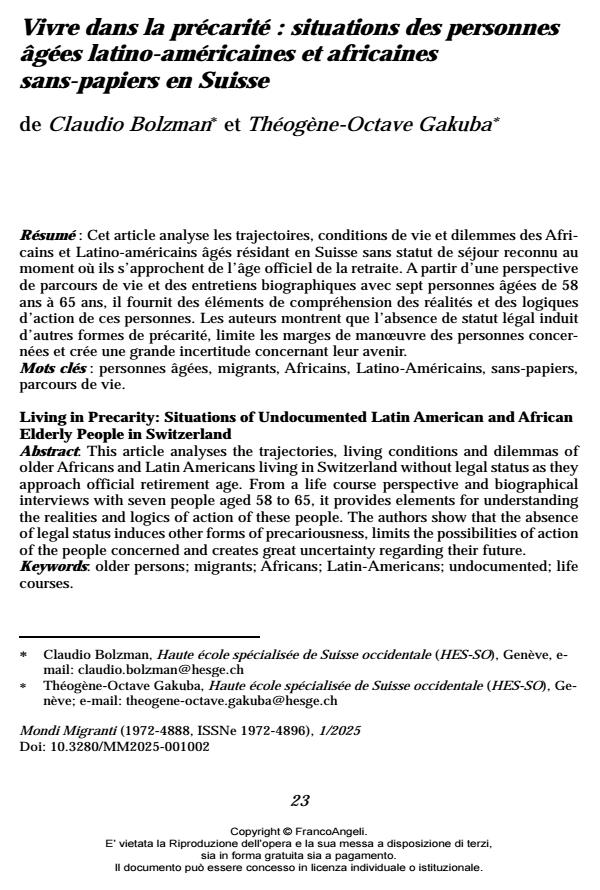Vivre dans la précarité : situations des personnes âgées latino-américaines et africaines sans-papiers en Suisse
Titolo Rivista MONDI MIGRANTI
Autori/Curatori Claudio Bolzman, Théogène-Octave Gakuba
Anno di pubblicazione 2025 Fascicolo 2025/1
Lingua Francese Numero pagine 25 P. 23-47 Dimensione file 124 KB
DOI 10.3280/MM2025-001002
Il DOI è il codice a barre della proprietà intellettuale: per saperne di più
clicca qui
Qui sotto puoi vedere in anteprima la prima pagina di questo articolo.
Se questo articolo ti interessa, lo puoi acquistare (e scaricare in formato pdf) seguendo le facili indicazioni per acquistare il download credit. Acquista Download Credits per scaricare questo Articolo in formato PDF

FrancoAngeli è membro della Publishers International Linking Association, Inc (PILA)associazione indipendente e non profit per facilitare (attraverso i servizi tecnologici implementati da CrossRef.org) l’accesso degli studiosi ai contenuti digitali nelle pubblicazioni professionali e scientifiche
Cet article analyse les trajectoires, conditions de vie et dilemmes des Africains et Latino-américains âgés résidant en Suisse sans statut de séjour reconnu au moment où ils s’approchent de l’âge officiel de la retraite. A partir d’une perspective de parcours de vie et des entretiens biographiques avec sept personnes âgées de 58 ans à 65 ans, il fournit des éléments de compréhension des réalités et des logiques d’action de ces personnes. Les auteurs montrent que l’absence de statut légal induit d’autres formes de précarité, limite les marges de manœuvre des personnes concernées et crée une grande incertitude concernant leur avenir. Mots clés : personnes âgées, migrants, Africains, Latino-Américains, sans-papiers, parcours de vie.
Questo articolo analizza i percorsi, le condizioni di vita e i dilemmi degli anziani africani e latino-americani residenti in Svizzera senza permesso di soggiorno valido al momento in cui si avvicinano all’età della pensione. A partire da una prospettiva di percorsi di vita e da interviste biografiche con sette persone anziane di età compresa tra i 58 e i 65 anni, l’articolo fornisce elementi per comprendere le realtà e le logiche d’azione di queste persone. Gli autori mostrano che l’assenza di uno statuto legale provoca altre forme di precarietà, limita le possibilità di manovra delle persone interessate e crea grande incertezza riguardo al loro futuro.
Parole chiave:persone anziane, migranti, africani, latino-americani, senza documenti, percorsi di vita.
Claudio Bolzman, Théogène-Octave Gakuba, Vivre dans la précarité : situations des personnes âgées latino-américaines et africaines sans-papiers en Suisse in "MONDI MIGRANTI" 1/2025, pp 23-47, DOI: 10.3280/MM2025-001002